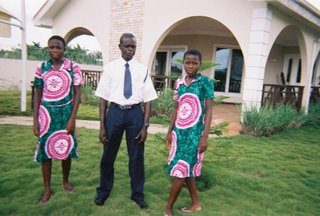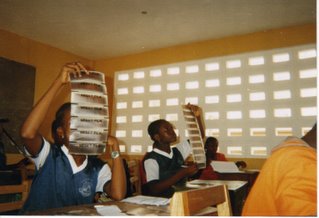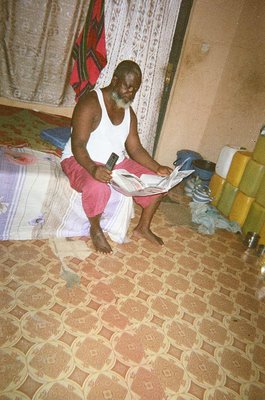
I share a desk and a classroom with five other subject teachers in a junior secondary school in Ghana, West Africa. I’ve been encouraged by the head teacher to stay after my class and observe the other J.S.S teachers to learn how teachers teach and children learn here on this continent. My English students, two dozen pre-teens, are quick learners, though often a giant yellow lizard or stray Billy goat will enter my classroom unannounced. It is in these moments, as the illusion of classroom order dissolves into shrieks and laughter, that I realize that to teach is to be exciting, but to teach well requires some discipline, or at least the threat of it.
Last Friday morning after my class ended, my students waited quietly at their desks for their next subject, while I sat at the teachers desk marking their scores for a pop quiz I had given on identifying adverbs and adjectives. My students displayed a firm grasp of the concept that there was a fifty per cent chance they could guess correctly. When Simon, the agricultural science teacher, walked into the classroom, they rose from their desks and said in unison, “You are welcome, sir!”
Simon began his class by returning the recent exams on water purification. He scolded the entire class for their poor performance and then began calling them one by one to the front of the classroom to collect their exams, each marked heavily with red ink. When the students reached the front of the classroom, he instructed each one to bend over and grab the end of the teacher’s desk, where I sat with my own red pen. For each wrong answer he raised a thin flexible cane and whipped the offender on the rear end, the number of swings depending on the number of incorrect answers.
“Good, better, best,” Simon said mechanically as he swung the cane. “I strive to do good and from good I will do better. From better, I will be the best.”
Priscilla Acquah, the smallest girl in the class, got the lowest score of anyone; over half of her questions were incorrect.
“How long must the water boil on the fire?” Simon asked his class and Priscilla bowed her head in shame as the entire class answered in unison.
“Five minutes, sir!”
“Name two water borne diseases,” he said looking at Priscilla. The class answered on her behalf.
“Diarrhea, sir!”
“Guinea worm, sir!”
While Simon did not for a moment seem to enjoy this, he went about the task efficiently. “Drinking dirty water is going to hurt more than this little cane,” he told them. “Do you want to make your children sick when you cook for them?” This question visibly puncture the realities of the thirteen year old girls in the classroom. They answered wide-eyed in unison, “No, sir.”
When it was over, the lesson began. The children dried their tears and got out their workbooks. It was time for agricultural science. Some kids pouted until the stinging subsided and then they were smiling and laughing again. Simon was teaching them about bush fires, which are, I learned, a very bad strategy for hunting bush animals as often they can often lead to destruction of personal property.
“Who can tell me what is the adverb in this sentence?” I asked that following Monday after returning the quizzes. Hands sprouted up before me, waving like reeds. Bushiratu took her best guess and joined her classmates in laughter when she realized it was wrong. When Aishatu got the answer right the class applauded in unison: Clap Clap Clap-Clap-Clap Clap!
My students watch me the way they would a creature from another planet. They don’t yet know what to make of the white hairs on my arms, my red beard, my awful handwriting, and my strange accent. Will I take them all to America if they ace this next quiz? Why do I like peanuts so much? And the biggest question of all: Why did I leave my rich and amazing country to live in Ghana and teach for no money? They fasten themselves to my every word, following each movement I make. Their excitement usually turns to frenzy, low murmurs erupting into laughter, disruptive conversations and, finally, objects being hurled across the room. The cane is always on the teacher’s desk. That Monday I picked it up and held it in my hands as I walked around the classroom.
“Sir, are you going to cane us?” Faridatu asked from the front row.
“I haven’t decided yet,” I said and it was enough.
Following the Monday afternoon teacher’s meeting, Simon and the Grade 4 English teacher, Godson, invited me to eat Banku with Okra soup. We sat around one bowl and, after washing our hands, we started to eat. Simon and Godson ate quickly and efficiently using only their right hands, spilling nothing on the table. When they finished, they washed up and began their daily tirade of questions about the U.S.A. while I dripped and dribbled where I sat.
“Is it true that in your country people have so much money that they purchase containers of food for their dogs costing over one hundred dollars?” Simon asked.
“Well, not exactly. And not everyone does that, “I said.
“How much is that in Ghana?” Godson asked looking amused.
“About nine hundred thousand cedis,” Simon answered. It occurred to me, not for the first time, that a hundred dollars was more than Simon and Godson were making in a month teaching at the Gina School. Our daily lunch conversations danced not so subtly around this point.
“You know, in the U.S., teachers do not cane their students,” I told them.
They stared at me for a while in silence.
“Then how do you threaten the children into learning?” Simon finally asked, when it was clear I wasn’t making a joke.
“Well,” I paused. “It’s different. At our best, we don’t have to threaten them. We might punish them by taking away their privileges. For example, if they don’t finish their work, they can’t go play on the monkey bars.”
“What kind of privileges?” Simon asked.
“So, there are monkeys in the U.S.? I heard there were none,” Godson said.
“No, no, okay bad example. The playground is what I mean.” I looked out over the brown dirt schoolyard scattered with trash where the children were kicking a wad of tape through two sneakers and struggled with how to begin describingthe playgrounds of my youth. “Okay, forget the monkey bars. Sometimes we call their parents if they’ve been acting bad in school.”
“So, their parents are allowed to cane them, but school teachers are not?”
“No, their parents aren’t supposed to cane them either.”
“The children are more respectful in America,” Simon said matter-of-factly to Godson.
“No, actually it’s the opposite,” I said. I tried to imagine one time in my life when I had said the words, “yes sir,” in unison with twenty other people.
“I don’t understand,” Godson said, again looking amused.
There was a long silence. I looked down at my bowl of soup, the glassy eyes of a tilapia stared back up at me.
“Things are just differet,” I said, wondering for a moment if they would ever be the same.
 Ampe
Ampe (Popular Children's Game in Ghana)



 It's been a while since I've updated you all on you on the project. I'm still here in Ghana (!!??) and working with a refugee resettlement NGO. I am not a teacher at the Gina school anymore, but I am still meeting with the students on Friday Afternoons to continue our photography classes. Last week, we had a special visit from Godwin Amazete, a Ghanaian photographer and good friend of mine, who told the class, among other things, that taking photographs was the most important thing in the world. He explained that their job as photographers is to create images, not just to record what is out there, but to invent it. He gave a humorous lecture on the importance of framing. Why is it important to get the whole body in the picture? What happens if u leave out the feet? What information might be missing then?
It's been a while since I've updated you all on you on the project. I'm still here in Ghana (!!??) and working with a refugee resettlement NGO. I am not a teacher at the Gina school anymore, but I am still meeting with the students on Friday Afternoons to continue our photography classes. Last week, we had a special visit from Godwin Amazete, a Ghanaian photographer and good friend of mine, who told the class, among other things, that taking photographs was the most important thing in the world. He explained that their job as photographers is to create images, not just to record what is out there, but to invent it. He gave a humorous lecture on the importance of framing. Why is it important to get the whole body in the picture? What happens if u leave out the feet? What information might be missing then?

 Most of their early rolls were of the chores they do around the house: cooking for the family, cleaning the compound, carrying, bathing and putting to bed their younger siblings, and finally studying under dim
Most of their early rolls were of the chores they do around the house: cooking for the family, cleaning the compound, carrying, bathing and putting to bed their younger siblings, and finally studying under dim

 Ampe (Popular Children's Game in Ghana)
Ampe (Popular Children's Game in Ghana)
 I took Eddie along to a student film shoot conducted by a few Ghanaian friends of mine at the Academy of Screen Arts in East Legon, Accra. The film was directed by Danny Abotei and Collins Amlalo, whom I met in summer 2004 when they were assigned to do a documentary film about the student group I brought over from the States with the Experiment in International Living.
I took Eddie along to a student film shoot conducted by a few Ghanaian friends of mine at the Academy of Screen Arts in East Legon, Accra. The film was directed by Danny Abotei and Collins Amlalo, whom I met in summer 2004 when they were assigned to do a documentary film about the student group I brought over from the States with the Experiment in International Living.












 "Juana La Virgin" Sumaiya Hakibu
"Juana La Virgin" Sumaiya Hakibu Nowadays, Eddie will knock on my door early in the morning and remind me to give him his weekly writing assignment if I forget. He's been getting more and more fearless when it comes to walking into the middle of the action and snapping what he sees and he's taken some beautiful portratis of his grandmother outside of their house. As I've mentjoned before, my long term goal is to create some kind of a book comprised of the children's photos and writing, which would sell to raise money to further their education in various forms. I still have to think long and hard about how that is going to work in any kind of sustainable way. Thank you so much to all of you who have helped to make this happen for the kids and for me and you'll hear from me again soon.
Nowadays, Eddie will knock on my door early in the morning and remind me to give him his weekly writing assignment if I forget. He's been getting more and more fearless when it comes to walking into the middle of the action and snapping what he sees and he's taken some beautiful portratis of his grandmother outside of their house. As I've mentjoned before, my long term goal is to create some kind of a book comprised of the children's photos and writing, which would sell to raise money to further their education in various forms. I still have to think long and hard about how that is going to work in any kind of sustainable way. Thank you so much to all of you who have helped to make this happen for the kids and for me and you'll hear from me again soon.




 My Grandmother Preparing Yakayaka, Edward Chao 1/22/05
My Grandmother Preparing Yakayaka, Edward Chao 1/22/05